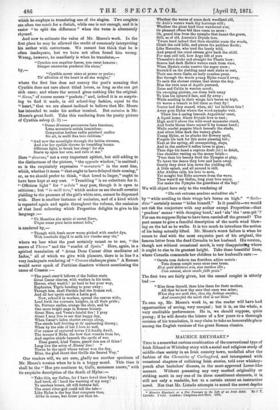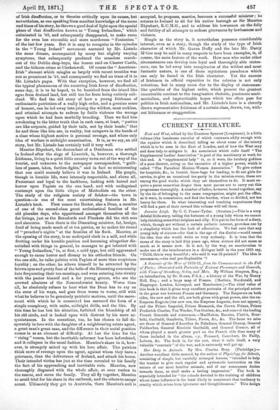MAURICE RHYNHART.*
Tins is a somewhat curious combination of the conventional type of Irish Riband or Whiteboy story with a social and religious study of middle-class society in an Irish country town, modelled after the fashion of the Chronicles of Carlingford, and interspersed with occasional chapters of rollicking Irish stories, told over whiskey- punch after bachelors' dinners, in the most approved Lever-like manner. Without possessing any very marked originality or striking merit in any one of its three constituent elements, it is still not only a readable, but to a certain extent an instructive novel. Not that Mr. Listado attempts to sound the secret depths * Maurice Rhynharl, or a Few Passages in the Life of an Irish Rebel. By J. 1'1. Listado. 2 vole. London : Chapman and Hall. 1871.
of Irish disaffection, or to theorize critically upon its causes, but nevertheless, as one speaking from manifest knowledge of the scene and times of his story, he throws a good deal of light upon the special phase of that disaffection known as "Young Irelandism," which culminated in '48, and subsequently disappeared, to make room for the even less excusable and more murderous " Fenianism " of the last few years. But it is easy to recognize in the episodes in the "Young Ireland" movement narrated by Mr. Listado the same disease, accompanied by many but slightly varying symptoms, that subsequently produced the senseless march- out of the Dublin shop-boys, the insane raid on Chester Castle, and the hideous crime at Clerkenwell. Of course the " American- Irish " element which mingles so largely with recent troubles was not so prominent in '48, and consequently we find no trace of it in Mr. Listado's pages. With that exception, however, we find all the typical phenomena of the recurring Irish fever of disaffection, some day, it is to be hoped, to be banished from the island like ague from drained land, but still too far from being entirely sub- dued. We find the old story of how a young Irishman of enthusiastic patriotism of a really high order, and a genuine sense of honour, can be led away into joining the wildest, most reckless, and criminal attempts to redress by futile violence the wrongs upon which he had been morbidly brooding. Then we find him awakening to the bitter truth that in such cases, at least, "parties are like serpents, guided by their tails, not by their heads ;" that he and those like him are, in reality, but catspaws in the hands of a class whose highest motive is personal revenge, and whose only idea of warfare is midnight assassination. It is, as we say, an old story, but Mr. Listado has certainly told it very well.
Maurice Rhynhart, the descendant of a Dutchman who settled in Ireland after the siege of Limerick, is, however, a thorough Irishman, living in a quiet little country town out of the way of the tourist, and unknown to the newspaper correspondent, "guilt- less of passes, lakes, faction-fights," and in fact so uninteresting that one could scarcely believe it was in Ireland. His people, though in humble life, were intensely respectable, and above all, Protestant and loyal to the backbone, looking with hatred and horror upon Papists on the one hand, and with undisguised contempt upon the little clique of Methodists on the other. The study of the religious society of Selskar—the town in question—is one of the most entertaining features in Mr.
Listado's book. First comes the Rector, also a Dean, a member of one of the second-class great ecclesiastical families of the old pluralist days, who apportioned amongst themselves all the fat livings, just as the Beresfords and Plunkets did the rich sees and sinecures. Then there is the Dissenting minister, fat, benign, fond of being made much of at tea parties, as he makes his round of"preacher's nights" at the firesides of his flock. Maurice, at the opening of the story, is an underpaid clerk in a mill, and while fretting-under his humble position and becoming altogether dis- satisfied with things in general, he manages to get infected with "Young Irelandisin," in, at first, a mild type, but still aggravated enough to cause horror and dismay to his orthodox friends. On the one side, he talks politics with Papists of more than suspicious toyality ; on the other, he allows himself to be attracted by the brown eyes and pretty face of the belle of the Dissenting community into frequenting their tea-meetings, and even entering into rivalry with the pastor himself and a fat young grocer, who are the avowed admirers of the Nonconformist beauty. Worse than all, he absolutely refuses to hear what the Dean has to say on the error of his ways, and goes from worse to worse, still with what he believes to be genuinely patriotic motives, until the move- ment with which he is connected has assumed the form of a simple conspiracy, with oaths, midnight drills, and the like. By this time he has lost his situation, forfeited the friendship of all his old circle, and is looked upon with distrust by his mere ac- quaintances. In the meantime, too, he has chosen to fall de- sperately in love with the daughter of a neighbouring estate agent, a great man's great man, and the difference in their social position comes in as an element of difficulty. At last the time for the " rising " comes, but the inevitable informer has been beforehand, and it collapses in the usual fashion. Maurice's share in it, how- ever, is strangely mixed up with his love affair. The patriots think more of revenge upon the agent, against whom they have a grievance, than the deliverance of Ireland, and attack his house. Their intended victim has just at the time revealed to his family the fact of his approaching and inevitable ruin. Maurice, now thoroughly disgusted with the whole affair, at once rushes to the rescue, and saves the family. They all fly together, Maurice to avoid trial for his share in the outbreak, and the others to escape arrest. Ultimately they get to Australia, there Maurice's suit is
accepted, he proposes, marries, becomes a successful minister; he returns to Ireland to sit for his native borough as Sir Maurice Rhynhart, K.C.M.G., and to address his townsmen on the folly and futility of all attempts to redress grievances by lawlessness and violence.
Simple as the story is, it nevertheless possesses considerable interest, even as a story, though the study of the type of Irish character of which Mr. Gavan Duffy and the late Mr. Darcy M'Gse may be said in many respects to have been examples, is, of course, the main feature of the work. How men who under other circumstances can develop into loyal and thoroughly able states- men, can be led away into conspiracies of the wildest and most fantastic nature, is one of those mysterious paradoxes which can only be found in the Irish character. Yet the success of Irishmen in official capacities in the colonies is not only notorious, but in many cases due to the display of statesman- like qualities of the highest order, which present the greatest conceivable contrast to the imaginative rhetoric, passionate senti- mentalism, and impracticable hopes which too often pass for politics in Irish nationalism, and Mr. Listado's hero is a cleverly drawn representative Irishman of a certain class, drawn, too, with- out bitterness or exaggeration.



































 Previous page
Previous page